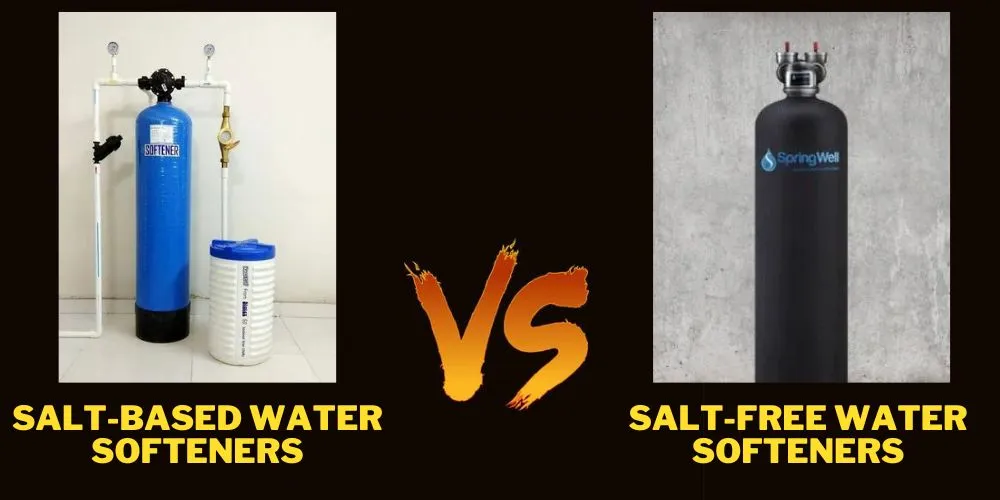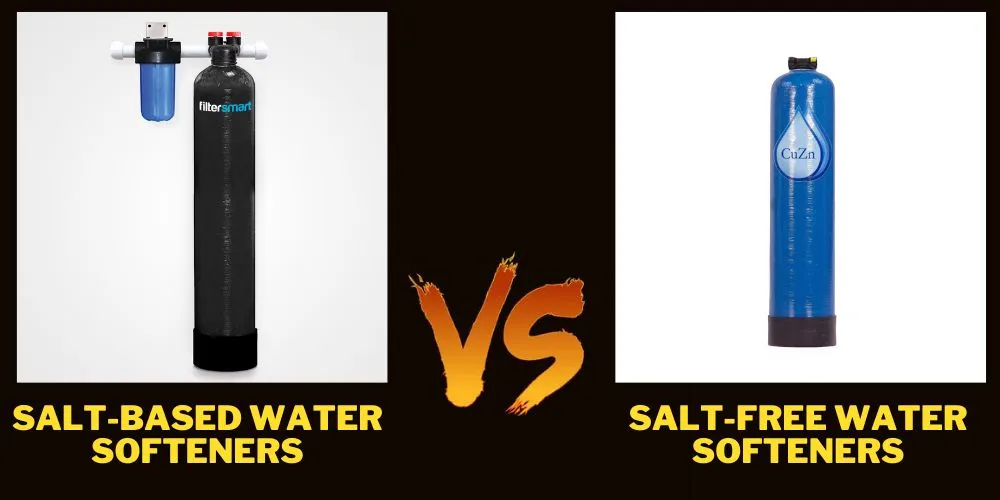Water plays a critical role in our daily lives. Yet, not all water is the same in quality.
Some water needs treatment to meet our household standards. This is where water softeners come into play.
They are divided into two categories: salt-based and salt-free.
This article aims to shed light on the debate of salt vs salt-free systems to find a conclusive winner among these two types of water softeners, helping you make an informed choice for your home.

💦 What is Hard Water?
Hard water contains a high level of minerals, mainly calcium and magnesium. It can stem from the well water or municipal supplies, where water flows through mineral-rich soil and rock.
Hard water can harm appliances, plumbing, and can also affect your health. Water softeners have been designed to tackle these issues effectively.
💦 The Basics of Water Softening
Water softeners improve the quality of the water in your home. They either remove minerals or change the way these minerals behave.
It is essential to understand that softening and conditioning are not the same. Softening removes minerals, while conditioning changes mineral properties so they don’t stick to surfaces.
💦 Salt-Based Water Softeners
How They Work
Salt-based water softeners use an ion exchange process. Here, minerals like calcium and magnesium are swapped for sodium ions.
This process happens in a tank filled with resin beads. Over time, the resin becomes saturated with minerals and needs to regenerate using a saltwater solution.
Pros
✅ The main advantage of salt-based softeners is their effectiveness.
✅ They can handle high levels of hardness and protect the longevity of your pipes and appliances.
✅ Many users also report a noticeable improvement in the feeling of water on their skin and hair.
Cons
❌ The drawbacks include the need for regular salt refills and the accompanying environmental impact.
❌ Salt-based systems discharge salty wastewater that can harm the environment.
❌ There is also a health angle to consider, as the softened water contains added sodium, which might not be suitable for everyone.
💦 Salt-Free Water Softeners
How They Work
Salt-free systems, often referred to as conditioners, do not remove minerals. Instead, they alter the structure of the minerals to prevent them from depositing as scale.
Technologies like Template Assisted Crystallization (TAC) achieve this without adding chemicals or salt to the water.
Pros
✅ These systems are low-maintenance as they do not require salt.
✅ They are more environmentally friendly due to the lack of discharged brine.
✅ Also, because they do not add sodium to the water, they could be healthier for your family.
Cons
❌ One disadvantage is that they may not work as well in areas with extremely hard water.
❌ It’s also important to clarify that they do not remove minerals; they simply change their form.
💦 Salt vs Salt-Free Systems: Side-by-Side Comparison
When considering salt-based vs salt-free systems, it’s crucial to compare features like maintenance needs, environmental impact, cost, and how effectively they treat hard water.

Installation and Maintenance
Salt-Based Systems
Installation of salt-based systems can be complex and often requires professional assistance. They need regular maintenance, including salt refills and cleaning to prevent blockages.
Salt-Free Systems
Salt-free systems are generally easier to install and maintain. They do not need salt refills or as much attention as salt-based softeners.
Cost Considerations
The upfront cost of both systems can be significant, but they also carry different operational costs. Salt-based systems require ongoing expenses for salt.
However, both systems can offer long-term savings by protecting your appliances and plumbing.
Health and Environmental Impacts
Health considerations are central when choosing a water softener. Salt-based systems add sodium to the water supply, which might not be ideal for everyone.
Environmentally, these systems also pose a challenge with their salt waste. Salt-free systems score better on both counts, with no added sodium and no environmental discharge concerns.
💦 Pro Tips
Before making your choice, consider how hard your local water is. Local regulations might also influence your decision. The size of your home and water usage will also dictate the most suitable system for you.
💦 User Experiences and Testimonials
Homeowners have shared that salt-based water softeners significantly reduce water hardness, enhancing appliance longevity but require regular maintenance and salt refills.
Conversely, salt-free softeners are lauded for their eco-friendliness and ease of use, though they might not fully eliminate hardness in areas with severe water conditions.
Personal stories highlight the trade-off between effectiveness and environmental considerations, demonstrating the importance of aligning the choice of system with individual needs and local water hardness levels.
💦 Frequently Asked Questions (FAQs)
What is the difference between water softening and water conditioning?
Water softening removes minerals, whereas conditioning changes their form but leaves them in the water.
Can a salt-free system provide the same level of water “softness” as a salt-based system?
Not exactly. Salt-free systems condition the water, which helps prevent scale but does not remove minerals.
How often do I need to refill the salt in a salt-based water softener?
This varies based on water usage and hardness, but typically it’s advised to check and refill the salt every 4-6 weeks.
Are there any health risks associated with using a salt-based water softener?
The added sodium in softened water can be an issue for those on low sodium diets.
Can I install a water softener system myself, or do I need a professional?
For salt-based systems, professional installation is usually recommended. Salt-free systems can be easier to install on your own, but following manufacturer guidelines is essential.
How do salt-free water softeners work without using salt?
They use technologies such as TAC to change the crystalline structure of minerals so that they do not form scale.
What maintenance does a salt-free water softener require?
While salt-free systems require less maintenance than salt-based, checking the system for blockages and ensuring it’s functioning properly is still needed.
Conclusion:
Deciding between salt-based and salt-free water softeners depends on your household’s needs and environmental values.
As we wrap up, remember the key differences and how they can help you achieve the water quality you desire in your home.

Devon Shorts, a seasoned expert with over a decade of experience in water safety, shares valuable insights on this blog “Aqua Safety Plus”. Trust his expertise to keep your water clean and your family safe.
